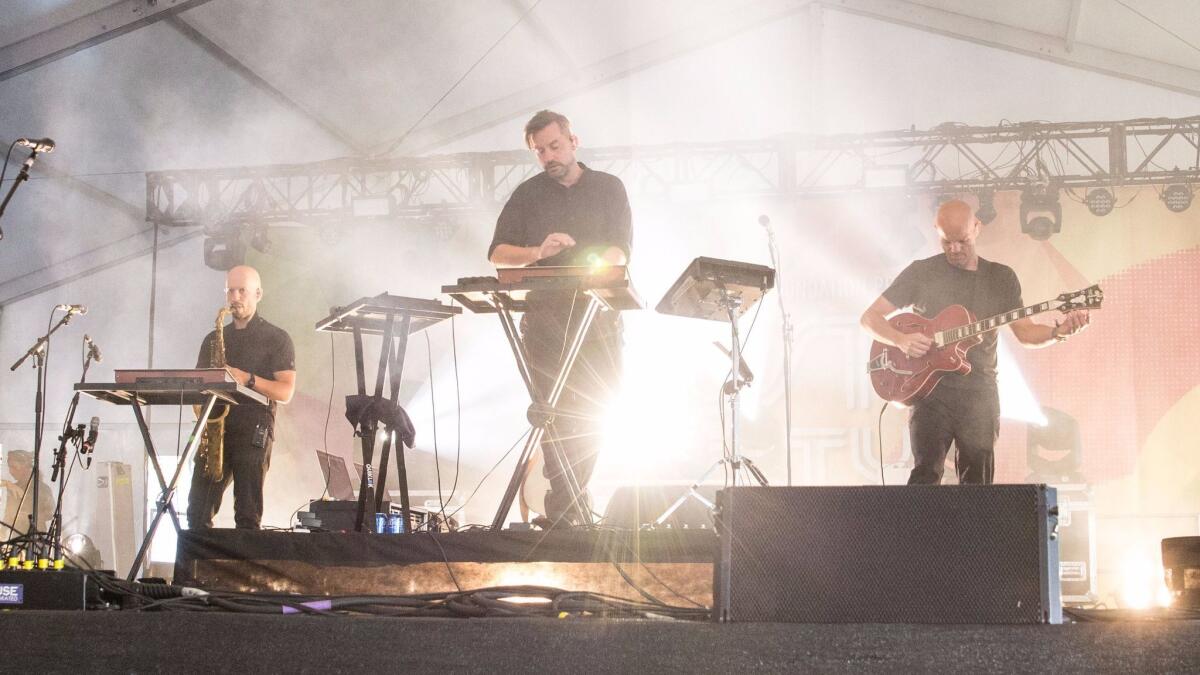Grammy nominees Odesza and Bonobo point to a post-EDM dance future

Hip-hop defined the Grammy nominations in 2017, but further down the bill, there was also a notable shift in how Recording Academy voters saw the year in electronic music.
This year, two acts – the duo Odesza and the producer Bonobo – each earned a pair of nominations for electronic music’s top two categories, for dance recording and dance/electronic album. Odesza is an ascendant arena act, one that headlined Staples Center earlier this year, that has done much to shift mainstream dance music away from DJ-driven spectacles and back to live performances of original music. Bonobo is a veteran U.K. artist with roots in jazz and global pop who, after 15-plus years, has finally ascended into a major act in the U.S.
Add in the fact that each did it on divisions of the same indie label, Ninja Tune, and they may be pointing the way to a post-EDM (electronic dance music) vision of dance music at the Grammys.
“In the wake of the EDM craze, there’s now space for people to take this music further,” said Jamie Collinson, the head of Ninja Tune’s North American operations. “The EDM explosion wasn’t necessarily all positive. This shows fans and Grammy voters are going deeper.”
On the day of the nominations, both Odesza and Bonobo were a bit overcome by the Grammys’ acknowledgment.
“It’s been surreal,” said Odesza’s Clayton Knight of the group’s Grammy nominations after this year’s album “A Moment Apart.” Odesza had previously been nominated for remixed recording, non-classical, but this was by far its biggest turn at the Grammys.
“It hasn’t really hit me yet. But yeah, it’s insane,” Knight said.
For years, the Grammys have been hit-or-miss on electronic music. For every savvy acknowledgment of the culture (like Skrillex’s 2011-12 rout of the awards), weird outliers sneak in (like the Al Walser, the amateur producer whose left-field nomination prompted the Recording Academy to alter its rules in regard to how many categories members could vote in).
Some wins are inevitable based on pop dominance (like the Chainsmokers), others have been pleasantly tasteful surprises (like the Australian producer Flume). While Odesza and Bonobo are two popular, inventive acts that are fairly established in electronic music, their nominations suggest some change is afoot.
“I didn’t see it coming, it feels great to have this happen 16 years into my career,” said Simon Green, the U.K.-raised but L.A.-based producer who performs as Bonobo. He released his album “Migration” in January. “There’s never been a moment of hype. There’s no one huge song or viral thing, it’s just all been on a natural curve.”
With these two indie-label acts as front runners, it seems like the Grammys have made a statement that the future of electronic music is moving out of Las Vegas-style mega-raves and into more thoughtful musical terrain.
Even in arenas, Odesza looks more or less like a band onstage, preferring racks of percussion, keys and samplers to CDJ’s or an obvious laptop.
“That’s always been our goal,” Knight said, about returning live musicianship to mainstream electronica. “We want everything with our music to translate in its own setting.”
“We love DJ and club culture,” added his bandmate Harrison Mills. “But we had to differentiate ourselves. We never play other people’s music live.”
Bonobo, even more so – Green performs with vocalists and a full live backing band, lending heft to his dance-driven but always adventurous arrangements. Dance and electronic music is rooted in club culture, but EDM has always been an awkward fit in arenas, where a single DJ (and, usually, a huge battalion of LED displays) as the only action onstage.
With this year’s Grammys, voters may have finally dropped the hint that they’re looking for something more involved onstage.
“I feel like North America is going through this post-EDM thing,” Green said. “I feel like people who were 18 five years ago now want something more, and having a real live show makes the music feel more tangible.”
A lot of the credit goes to the quickly expanding label group Ninja Tune. For years, in the U.S. they were a respected, mostly underground imprint that, in 2017, became a major player at the top tiers of electronic music here. They opened an L.A. office in 2009 and expanded in 2012 to complement their London and Montreal outposts (a likely useful gesture for convincing local Grammy voters). With a pair of their acts playing the city’s biggest arenas, it’s easy to see how Grammy voters recognized a label on the upswing.
“We talked to lots of people and made sure to have a big campaign this year. Pete Tong and Jason Bentley were longtime supporters, and we knew we had a real chance,” Collinson said. “The Grammys have been getting really interesting people like Flying Lotus on their [genre selection] panels, who realize there’s a deeper side to the music.”
They’ll have competition in the dance categories from well-known acts like LCD Soundsystem, Kraftwerk and Gorillaz. But Odesza and Bonobo are the only ones to be up for both major categories, and it’s likely one or both will take something home at the main event.
But even without the trophies, the Grammys are already nodding to a serious change in what dance music looks like onstage in 2017.
“[EDM] just went as far as it could go,” Green said. “That was all about ‘How many LED’s can you throw up?’ We had to develop something more cerebral.”
For breaking music news, follow @augustbrown on Twitter.
ALSO:
More to Read
The biggest entertainment stories
Get our big stories about Hollywood, film, television, music, arts, culture and more right in your inbox as soon as they publish.
You may occasionally receive promotional content from the Los Angeles Times.











